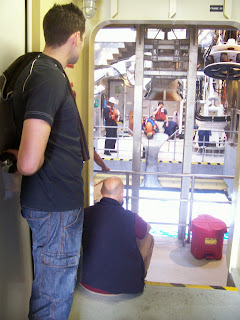 (from EOL)
(from EOL)
Today, a sobering paper I discovered regarding the thermal tolerance (i.e., how much of a temperature change can be tolerated) of the common Antarctic brittle star Ophionotus victoriae!
This post focuses on a study of the large and commonly encountered Antarctic brittle star Ophionotus victoriae (Family Ophiuridae) by Lloyd S. Peck, Alison Massey, Michael Thorne, and Melody Clark at the British Antarctic Survey, published this year (2009) in Polar Biology 32: 399-402.
The authors tested the ability of Ophionotus to respond to temperature changes over a discrete time period. They tested and compared two test groups, by increasing the temperatures of two test groups of brittle stars in two different tanks, one at a +2 °C and one at a +3°C (over their ambient temperature 0.4 degrees C) to see how long they would survive.
The authors tested the ability of Ophionotus to respond to temperature changes over a discrete time period. They tested and compared two test groups, by increasing the temperatures of two test groups of brittle stars in two different tanks, one at a +2 °C and one at a +3°C (over their ambient temperature 0.4 degrees C) to see how long they would survive.
Their results?
NONE of the animals were able to acclimate.
Their experiments showed that survival at +2 degrees C was about double that of the +3 degrees C batch. The threshold for this species is REALLY narrow. They can apparently handle ONLY a increase of +0.5 (from 0.4) degree C without any mortalities. To quote the authors:
"This is possibly the poorest acclimation ability of any species on record"
To spell this out: These brittle stars can't stand temperature change. They can tolerate a water temperature change of ONLY about 0.1 degree. If exposed to long-term temperature increase all of their body processes start to fail, the same way you would if you were left in the middle of a 90 degree day in the middle of the desert
How did this compare with other Antarctic megafauna?
Fish were the hands-down winners. They could apparently survive an increase of +4 degrees for periods in excess of 16 WEEKS!!
 (Picture from the Alfred Wegener Institut for Polar and Marine Research)
(Picture from the Alfred Wegener Institut for Polar and Marine Research)
The Antarctic Odontaster validus was able to withstand a heightened temperature of +6 deg. C !!(although time was not listed)
 (from the Underwater Field Guide to Ross Island & McMurdo Sound)
(from the Underwater Field Guide to Ross Island & McMurdo Sound)So, the implications of this study are obvious (Can you say GLOBAL WARMING?).
Its not clear why or HOW some species are more temperature resistant then others but it seems likely that they are dependent on the individual TAXON (i.e., genus, species, whatever).
And while experiments like this should not be considered the final word, it does give some kind of barometer of capable these different species might be when facing a massive temperature change over a long period.
 Some taxa will be able to adapt to temperature changes better then others. Various estimates have placed a rise of +2 deg. C over the next 100 years which is a rate FASTER then anything seen over the past million years or on record over the last glacial cycle.
Some taxa will be able to adapt to temperature changes better then others. Various estimates have placed a rise of +2 deg. C over the next 100 years which is a rate FASTER then anything seen over the past million years or on record over the last glacial cycle.Gradual temperature change can affect the effectiveness of feeding, reproduction, the ecology and food webs between these species will be substantially affected. You're talking about potentially a huge cascade collapse of the primarily invertebrate ecosystem in this area.
You want delicate Antarctic animals in the balance? Forget the Penguin. Forget the Fish.
Mind the brittle stars.





















































